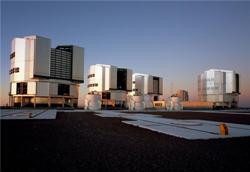Feb 25 2010
UK planetary science will be among those to benefit from an exceptional award of 82 nights of European Southern Observatory (ESO) telescope time made to an international team of astronomers led by Dr Stephen Lowry from the University of Kent.
 Three of the four Unit Telescopes of ESO’s Very Large Telescope (VLT). The VLT is the world’s most advanced optical instrument, consisting of four Unit Telescopes with main mirrors of 8.2-metre diameter. The site of the VLT is located in the northern deserts of Chile
Three of the four Unit Telescopes of ESO’s Very Large Telescope (VLT). The VLT is the world’s most advanced optical instrument, consisting of four Unit Telescopes with main mirrors of 8.2-metre diameter. The site of the VLT is located in the northern deserts of Chile
This award, spread over 4 years, will enable Dr Lowry and his team to study how near-Earth asteroids (NEAs) react to a phenomenon known as the YORP effect. It will also boost the national and international research profile of the University’s Astronomy, Astrophysics and Space Sciences programmes.
ESO is the foremost intergovernmental astronomy organisation in Europe and the world’s most productive astronomical observatory. It provides state-of-the-art research facilities to astronomers and is supported by most European countries, including the UK. Each year, about 2,000 proposals are made for the use of ESO telescopes, requesting between four and six times more nights than are available. Generally, an allocation of one to two nights in any given six-month period is considered to be a success for individual research astronomers.
Dr Lowry explained: ‘With a provision of 82 nights telescope time, we expect to be able to monitor a large sample of near-Earth asteroids over many years and to look for signs of the YORP effect acting on them. We can also perform detailed studies of their surface properties to help understand the processes that drive the effect.’
Dr Lowry also explained the benefits for UK planetary science. ‘Over the next four years we expect some exciting results, leading to major developments in the field of near-Earth asteroid science. This will not only lead to additional awards of telescope time for studies in this area by UK astronomers, but will also boost the international profile of planetary science in the UK.’
Professor Paul Strange, Head of the University’s School of Physical Sciences, commented: ‘I congratulate Dr Lowry on obtaining this award. Such a large allocation of telescope time could only be gained by a truly world-class research project. This is a huge boost to the profile of planetary science in the School of Physical Sciences at Kent and to the South East Universities Physics Network of which Kent is a key member.’
Professor Peter Jeffries, Dean of the Faculty of Sciences, added: ‘This important award recognises our commitment to the international research effort in Planetary Science. Stephen was appointed to Kent as part of our contribution to the South East Universities Physics Network. We are proud that his work has been recognised in this way and look forward to some exciting observations as a result of this exceptional access to telescope time.’
The project will be conducted in collaboration with astronomers from Europe and the US. Team members include: Dr Simon Green, Dr Stephen Wolters and Ben Rozitis (Open University); Professor Alan Fitzsimmons and Samuel Duddy (Queen's University of Belfast); Dr Colin Snodgrass (Max Planck Institute for Solar System Research, Germany); Ryan Laird (University of Kent); and Dr Paul Weissman and Dr Michael Hicks (NASA's Jet Propulsion Laboratory, California, USA).